|
DID
YOU KNOW.....
THE
FOOTBALL PROGRAMME MISCELLANY
Football has a million
and one stories and just as many facts and figures. Here are a few of them
- the record-breaking, unusual and bizarre. More
Did You Knows...
Index
1 2
3 4
5 6 7
8 9
10 11
12 13
14 15
16 17
18 19
20
21 22
23 24 25
26 27
28 29
30 31
32 33
34
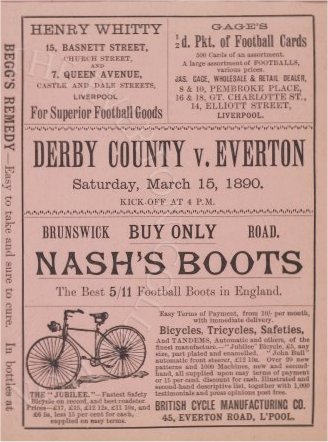 Football
programmes - well at least the forerunners of programmes as we know them -
have been around since organised football started back in the 1870's.
Originally they were based on cricket scorecards being little more than a
single card printed with the names of the respective teams and were given
away free or sold for a halfpenny. Many of the cards were issued by
advertisers rather than clubs themselves - even in those days football was
seen as a way advertisers could get their message through to the masses.
With football attendances growing and with it the potential of increasing
advertising income the clubs saw the programme as a valuable source of
income. So in a nutshell money saw the programme increase in size from
their single-sheet origins to the magazines we are all now used to. In my
opinion the best record of the development of programmes over the years -
as well as an amazing history of a single club - can be found in the
Everton Collection. I don't like to see you go but if you would like to
take a look, click on
http://www.evertoncollection.org.uk. Football
programmes - well at least the forerunners of programmes as we know them -
have been around since organised football started back in the 1870's.
Originally they were based on cricket scorecards being little more than a
single card printed with the names of the respective teams and were given
away free or sold for a halfpenny. Many of the cards were issued by
advertisers rather than clubs themselves - even in those days football was
seen as a way advertisers could get their message through to the masses.
With football attendances growing and with it the potential of increasing
advertising income the clubs saw the programme as a valuable source of
income. So in a nutshell money saw the programme increase in size from
their single-sheet origins to the magazines we are all now used to. In my
opinion the best record of the development of programmes over the years -
as well as an amazing history of a single club - can be found in the
Everton Collection. I don't like to see you go but if you would like to
take a look, click on
http://www.evertoncollection.org.uk.
*******
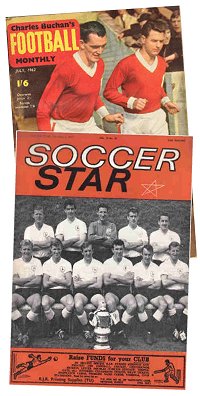 So,
when did collecting programmes start? Given that I think that we all have
a collecting gene in us I guess from the day programmes were first issued.
But when did it start becoming popular? I would say from the late 1950's.
When I started attending matches in the early 1960s there were no club
shops and all you could buy at the match was a programme, a rosette and a
club badge. So programmes it was. They were cheap, they were small and so
easy to store and cheap to send by post. They had no great value so it was
not unusual for a friend or family member to say 'I know that I have
got some programmes in the loft' which was followed by a gift of some
amazing programmes. Programme dealers started to appear - amongst the
first were David Stacey of Wickford and the Manchester Programme Shop and
their adverts in the likes of Football Monthly and Soccer Star
allowed collectors to build up a varied collection from a single source.
Just look at some of those old ads - cup finals, internationals and even
Northern Rhodesia v Bolton for just a few pence each! The Soccer Star
also offered free ads to collectors who wanted to make exchanges. Clubs
started to see that money could be raised from old programmes and the
likes of Bill Mainwood at Watford, Ian Mills at Notts County, Harold Finch
at Crewe, Barry Watson at Doncaster and Sid Woodhead at Grimsby all ran
very successful programme shops with programme fairs also bringing
together the collecting fraternity. So,
when did collecting programmes start? Given that I think that we all have
a collecting gene in us I guess from the day programmes were first issued.
But when did it start becoming popular? I would say from the late 1950's.
When I started attending matches in the early 1960s there were no club
shops and all you could buy at the match was a programme, a rosette and a
club badge. So programmes it was. They were cheap, they were small and so
easy to store and cheap to send by post. They had no great value so it was
not unusual for a friend or family member to say 'I know that I have
got some programmes in the loft' which was followed by a gift of some
amazing programmes. Programme dealers started to appear - amongst the
first were David Stacey of Wickford and the Manchester Programme Shop and
their adverts in the likes of Football Monthly and Soccer Star
allowed collectors to build up a varied collection from a single source.
Just look at some of those old ads - cup finals, internationals and even
Northern Rhodesia v Bolton for just a few pence each! The Soccer Star
also offered free ads to collectors who wanted to make exchanges. Clubs
started to see that money could be raised from old programmes and the
likes of Bill Mainwood at Watford, Ian Mills at Notts County, Harold Finch
at Crewe, Barry Watson at Doncaster and Sid Woodhead at Grimsby all ran
very successful programme shops with programme fairs also bringing
together the collecting fraternity.
Programme collecting was probably at
its peak in the 1980s and since then there was been a decline in its
popularity. The reasons? Well, the modern programme has turned into a
magazine which is expensive to buy, bulky to store and costs a small
fortune to send by post. Programme Shops have made way for Club Shops
which sell practically everything but programmes - not profitable
enough....and they make the place look untidy! Usually they have no more
than a few unsold current
 season issues. And perhaps worst of all the new
collector doesn't seem to get the gifts of programmes to encourage
the collecting bug. I well remember being given the 1953 England v Hungary
and Blackpool v Bolton FA Cup final programmes plus dozens of pre-League
Peterborough programmes - nowadays with ebay and the major auction houses
arranging sales of sporting memorabilia everyone has an idea of the value
of programmes. Sadly often an exaggerated idea of the value. the humble
programme is no longer humble! season issues. And perhaps worst of all the new
collector doesn't seem to get the gifts of programmes to encourage
the collecting bug. I well remember being given the 1953 England v Hungary
and Blackpool v Bolton FA Cup final programmes plus dozens of pre-League
Peterborough programmes - nowadays with ebay and the major auction houses
arranging sales of sporting memorabilia everyone has an idea of the value
of programmes. Sadly often an exaggerated idea of the value. the humble
programme is no longer humble!
*******
Programme Misprint 1. As all self-respecting anoraks will know
Millwall were once known as Millwall Athletic. They became just Millwall
in the early 1900s but memories are long and 60 years or so later a number
of programmes made the mistake of introducing their London visitors as
Millwall Athletic. Sheffield United were the first, in August 1968,
followed by Leicester in the 1969/70 season. Amazingly no-one seemed to
have had a quiet word with the Leicester programme production team because
a year after first making the mistake they made the same mistake again.
And the mistakes on the cover were not isolated ones with each programme
also continuing with the error on the team pages, pen pictures and team
picture. It has to be said though that Leicester seem to have more than a
passing interest in the past. Back in February 2003 fans had a vote on if
Leicester City should revert to their former name of Leicester Fosse.
The Story.
*******
Programmes get a rarity value for
many different reasons. The 1924 Aston Villa v Newcastle United FA Cup
Final programme is the rarest of all Wembley cup finals for a couple of
reasons. First their was a four-fold increase in price since the previous
final, from 3d to one shilling (a shilling is 5p), which put people off
buying any - and then there was the rain. The Wembley of 1924 was not the
completely covered ground of the modern era and when it rained over
Wembley in 1924 you got wet. Unless, that is, you used your programme as a
makeshift umbrella which many people in 1924 did. As a result not many
1924 FA Cup final programmes survived intact.
Fast forward to early 1974. It was a
time when we had miners and we relied on the coal they produced to keep us
supplied with electricity. When they went on strike the lights started to
go out - literally in the case of football. To conserve coal supplies the
first three months of 1974 saw a three-day week imposed on businesses -
including football clubs - allowing use of electricity only during those
three days. Floodlights were considered a non-essential use of
electricity and so they were turned off - matches having to be played on
week-day afternoons rather than evenings and kick off times being brought
forward on Saturdays. The Rochdale v Cambridge United 3rd Division match
was one that was played at an awkward time - on a Tuesday afternoon in
February - and was watched by a crowd of just 450. Sunday football was
introduced for the first time largely due to the hope of better
electricity supplies on a Sunday
(Sunday
football). The effect on the humble programme? Well, Sunday
programmes were a new collecting opportunity but for the most part many
programmes from the era of the three day week have become
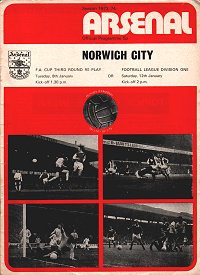 amongst the most elusive for collectors to get their hands on. Because of
the lower attendances fewer programmes were issued and because the
printers were only able to operate for part of the week many of the 'programmes'
that were printed were no more than single page team sheets.
amongst the most elusive for collectors to get their hands on. Because of
the lower attendances fewer programmes were issued and because the
printers were only able to operate for part of the week many of the 'programmes'
that were printed were no more than single page team sheets.
In January 1974 Arsenal issued what
surely be a unique programme because of the three day week. Drawn away to
Norwich in the FA Cup they knew that their next home match would either be
a Cup replay against Norwich or a League match against the same
opposition. If they waited for the cup result they wouldn't have had time
to produce a programme for the replay which would have been played three
days later so they issued a programme which could be used for either match
with the following explanation in the programme -
|
This Programme |
|
The three-day working week has caused us
considerable problems with the production of this programme. The
three working days allocated to our printers are Thursday, Friday
and Saturday, which meant that if we drew at Norwich, it would not
be possible to produce a programme for the replay on the following
Tuesday. To us a Cup-tie without a programme seems reprehensible.
The solution lay in the fact that we were to play Norwich in the
League on the following Saturday, so even before the Cup-tie at
Norwich, this programme was printed to serve a double purpose - the
replay, or if no replay, the League match. If it is used for a
replay, then we then have Thursday, Friday and Saturday to make
arrangements for some sort of programme for the League match. It was
the only course open to us in the circumstances. |
Arsenal won the cup match 1-0 -
problem over!
Arsenal results 1973-74.
*******
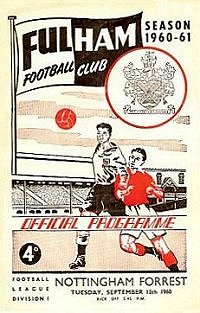 Programme
Misprint 2. When Fulham entertained Nottingham Forest in a First
Division match in September 1960 life was probably as good as it got for
Fulham fans. They were watching a team that included Tony Macedo, George
Cohen, Alan Mullery and Johnny Haynes beat Forest 1-0 to lift themselves
to the amazing heights of 7th in the top division. Then, as now, some
achievement. The crowd wasn't brilliant - just 13,630 - but at least
everyone of them who bought a programme had something to smile about. If
you are going to make a spelling mistake in a programme you would prefer
it to be bottom of page 17 and certainly not on one of the most prominent
parts of the front cover. Now where was the proof reader? Still it has to
be said that Forest supporters reckon that the name of their club is the
most frequently misprinted name in the League - how often have you seen
Notts Forest on the cover of a programme? Programme
Misprint 2. When Fulham entertained Nottingham Forest in a First
Division match in September 1960 life was probably as good as it got for
Fulham fans. They were watching a team that included Tony Macedo, George
Cohen, Alan Mullery and Johnny Haynes beat Forest 1-0 to lift themselves
to the amazing heights of 7th in the top division. Then, as now, some
achievement. The crowd wasn't brilliant - just 13,630 - but at least
everyone of them who bought a programme had something to smile about. If
you are going to make a spelling mistake in a programme you would prefer
it to be bottom of page 17 and certainly not on one of the most prominent
parts of the front cover. Now where was the proof reader? Still it has to
be said that Forest supporters reckon that the name of their club is the
most frequently misprinted name in the League - how often have you seen
Notts Forest on the cover of a programme?
*******
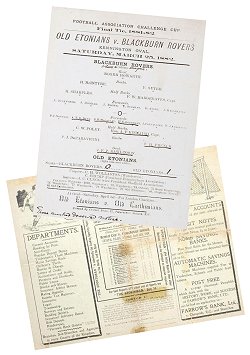 Well,
at least there is one footballing area where the English seem to have
the world record all to themselves - the world record price for a football
programme. I think that the important programmes are the ones that have
sentimental value to the purchasers - the first match attended, a
promotion decider/cup final or a programme autographed by a
favourite playerfor example. But they also have a financial value which -
as with any collectable - will depend on factors such as age, rarity,
condition, popularity. Well,
at least there is one footballing area where the English seem to have
the world record all to themselves - the world record price for a football
programme. I think that the important programmes are the ones that have
sentimental value to the purchasers - the first match attended, a
promotion decider/cup final or a programme autographed by a
favourite playerfor example. But they also have a financial value which -
as with any collectable - will depend on factors such as age, rarity,
condition, popularity.
Back in May 2006 Graham Budd Sporting Auctioneers sold a copy of the 1889
Preston v Wolves FA Cup Final programme for a world record £19,000 - or
£21,850 with the buyers premium. In May 2012 at the same auctioneers a
new record was set with a winning bid of £20,000 by a British collector
for the match card of Manchester United's first FA Cup final victory,
against Bristol City in 1909 played at the old Crystal palace ground. The
card originally cost 1d (one old penny) and was held together by sellotape
but with the addition of the buyers premium the purchaser paid £23,500
for it.
In May 2013 the record was smashed when Sotherby's sold
a copy of the earliest known surviving FA Cup Final programme - the 1882
final between Old Etonians and Blackburn Rovers played at the Kennington
Oval - for a whopping £30,000 (or £35,250 with premium). The programme
was bought by the Old Etonians Football Club to display at Eton College's
Museum of Eton Life. So one-up to the rich boys!
At the same auction that the world record was set the
winning bid for 1901 FA Cup Final replay programme between Tottenham and
Sheffield United played at Burnden Park, Bolton was a 'mere' £15,000. I
must dig out my copy of the 1975 final and get it over to Sotherby's!
*******
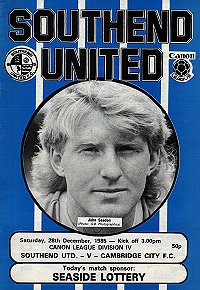 Programme
Misprint 3. In Peterborough local legend has it that the only reason
Cambridge United were voted into the Football League in 1970 (back then it
was by a vote) was because the clubs thought they were voting for
Cambridge City, City having traditionally been the more successful
Cambridge club up to that point. As you can probably guess from that
comment Peterborough United and Cambridge United share that special kind
of local rivalry! But perhaps the people of Southend have heard the same
thing because when Cambridge United turned up for a Division 4 match at
Roots Hall on Saturday 28th December 1985 the front cover of the Southend
programme introduced them as Cambridge City! For the record Cambridge
United lost 1-0 in Cambridge City's only match in the Football League! Programme
Misprint 3. In Peterborough local legend has it that the only reason
Cambridge United were voted into the Football League in 1970 (back then it
was by a vote) was because the clubs thought they were voting for
Cambridge City, City having traditionally been the more successful
Cambridge club up to that point. As you can probably guess from that
comment Peterborough United and Cambridge United share that special kind
of local rivalry! But perhaps the people of Southend have heard the same
thing because when Cambridge United turned up for a Division 4 match at
Roots Hall on Saturday 28th December 1985 the front cover of the Southend
programme introduced them as Cambridge City! For the record Cambridge
United lost 1-0 in Cambridge City's only match in the Football League!
*******
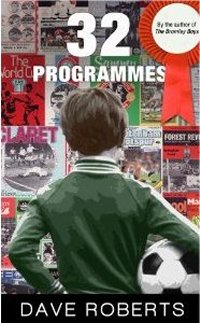 Books
about programmes are usually nothing more than picture books of programme
covers, the better ones having a description of the programme and perhaps
a match report. At last there is something considerably better. 32
programmes is the story of Dave Roberts and his programme
collection. When Dave moves to the USA,
his wife informs him that they can only take what is ‘absolutely
essential’. Packing his collection of football programmes - 1134 of them -
Dave is aghast to be informed that the programmes do not fall into that
category. He must whittle down his treasured archive to only what will fit
inside a Tupperware container the size of a Dan Brown hardback.
32 Programmes
tells the story of how Dave made the selection of his most important
programmes, and how the process brought back a flood of nostalgia for past
times. As the sights, sounds and smells of those 1,134 football matches
return, the choices Dave makes reflect the twists and turns that life
takes. So if you could only chose to keep 32 of the programmes from your
collection which ones would you keep? Books
about programmes are usually nothing more than picture books of programme
covers, the better ones having a description of the programme and perhaps
a match report. At last there is something considerably better. 32
programmes is the story of Dave Roberts and his programme
collection. When Dave moves to the USA,
his wife informs him that they can only take what is ‘absolutely
essential’. Packing his collection of football programmes - 1134 of them -
Dave is aghast to be informed that the programmes do not fall into that
category. He must whittle down his treasured archive to only what will fit
inside a Tupperware container the size of a Dan Brown hardback.
32 Programmes
tells the story of how Dave made the selection of his most important
programmes, and how the process brought back a flood of nostalgia for past
times. As the sights, sounds and smells of those 1,134 football matches
return, the choices Dave makes reflect the twists and turns that life
takes. So if you could only chose to keep 32 of the programmes from your
collection which ones would you keep?
*******
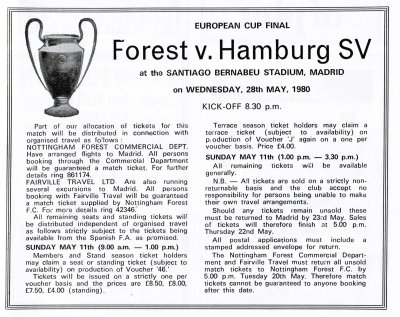
I came across this advert in
an old Forest programme - seems hard to believe now. Nottingham Forest
selling tickets for their European Cup final against Hamburg - Forest were
the European Cup holders in 1980 and retained the trophy in that match in
Madrid. Top price tickets were a fortune - £8.50 - while you could stand -
in a final - for just £4. You even needed to send a stamped addressed
envelope for the return of tickets by post - on-line tickets weren't even
being dreamed of then! And in my opinion all that was down to Brian Clough -
he should have managed England!
*******
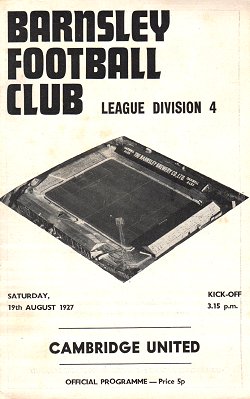 Programme
Misprint 4. It's not unusual for programmes of January matches to be
printed with the old year on the cover. I guess that mistake is just as
easy for the programme proof-reader to miss as it for any of us. It's a
little bit more unusual for a programme date to be a year out once January
has passed and we become used to the date of the new year. Probably the
most famous example of that is the Millwall v Derby Division 1 match
played on Saturday September 3rd 1988 - but it was dated 1987. It was
Millwall's first home match in the top flight. The biggest error on
date I have come across is in the pen-pictures for the Charlton v
Southampton League Cup tie in September 1976. For Hugh Fisher the
pen-picture read 'Joined Saints back in 1679 from Blackpool' and
not surprisingly it added that he was 'the club's senior professional'.
It should have been 1967! But as far as errors on the programme cover go
the biggest difference in
date that I have come across is 45 years - the Barnsley v Cambridge United
Division 4 match played on Saturday 19th August 1972 was dated 1927. How
much would that programme be worth if it was a genuine 1927 issue I
wonder? Programme
Misprint 4. It's not unusual for programmes of January matches to be
printed with the old year on the cover. I guess that mistake is just as
easy for the programme proof-reader to miss as it for any of us. It's a
little bit more unusual for a programme date to be a year out once January
has passed and we become used to the date of the new year. Probably the
most famous example of that is the Millwall v Derby Division 1 match
played on Saturday September 3rd 1988 - but it was dated 1987. It was
Millwall's first home match in the top flight. The biggest error on
date I have come across is in the pen-pictures for the Charlton v
Southampton League Cup tie in September 1976. For Hugh Fisher the
pen-picture read 'Joined Saints back in 1679 from Blackpool' and
not surprisingly it added that he was 'the club's senior professional'.
It should have been 1967! But as far as errors on the programme cover go
the biggest difference in
date that I have come across is 45 years - the Barnsley v Cambridge United
Division 4 match played on Saturday 19th August 1972 was dated 1927. How
much would that programme be worth if it was a genuine 1927 issue I
wonder?
*******
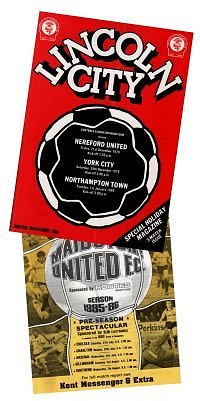 Well,
I'm sure that we've all got tournament programmes in our collections but
forgetting those which single programme covers the most amount of matches?
For non-competitive matches the highest I have come across is a Maidstone
United programme which covers 5 friendlies at the start of the 1985/86
season. Between Saturday 27th July and Wednesday 7th August 1985 Maidstone
- managed by Barry Fry - played friendlies against Chelsea, Charlton,
Arsenal, Gillingham and Southend with one programme covering the lot. For
competitive matches it is not unusual to find a programme that covers 2
matches played over Christmas but my record is a programme that covers 3
matches played over the Christmas/New Year period. If nothing else its
unusual for a club to have three home games during that period. Lincoln
City did in the 1979/80 season with the programme covering matches at
Sincil Bank against Hereford United, York City and Northampton. Can you do
better? Well,
I'm sure that we've all got tournament programmes in our collections but
forgetting those which single programme covers the most amount of matches?
For non-competitive matches the highest I have come across is a Maidstone
United programme which covers 5 friendlies at the start of the 1985/86
season. Between Saturday 27th July and Wednesday 7th August 1985 Maidstone
- managed by Barry Fry - played friendlies against Chelsea, Charlton,
Arsenal, Gillingham and Southend with one programme covering the lot. For
competitive matches it is not unusual to find a programme that covers 2
matches played over Christmas but my record is a programme that covers 3
matches played over the Christmas/New Year period. If nothing else its
unusual for a club to have three home games during that period. Lincoln
City did in the 1979/80 season with the programme covering matches at
Sincil Bank against Hereford United, York City and Northampton. Can you do
better?
*******
Programme
Misprint 5. It seems like another lifetime
but there was a time when Cloughie and his Nottingham Forest side ruled
Europe. And they did it for two seasons - winning the European Cup in
1978/9 and retaining it the following season. Our continental neighbours
also seemed to have a problem or two getting to grips with the name of the
dominant East Midlands city. In May 1980 the programme for the final
against Hamburg at Real Madrid's Santiago Bernabeu Stadium announced the
match as Nottinghagm Forest v Hamburg. To be fair though the
mistake was picked up and corrected to Nottingham but programmes with the
spelling mistake did go on general sale. Perhaps a great tactic by the
printers. Selling programmes to collectors adds many thousands to the
total programmes sold and having two versions to collect - the properly
printed and misprinted issues - must surely increase the print run. The
cynic in me says that I'm surprised it doesn't happen more often!
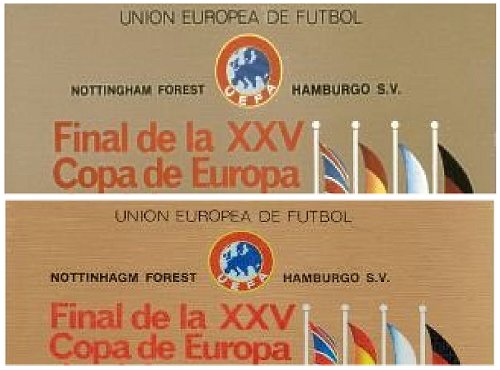
*******
The programmes with the most
unlikeliest of opposition? My mind goes straight to matches played in the
old First Division by Leyton Orient (1962/63), Northampton Town (1965/66)
and Carlisle United (1974/75). Although its disappointing that sort of
thing doesn't happen now the only way you can believe that they were once
in the top flight is to see programmes of their matches against the likes
of Arsenal, Liverpool and Manchester United. Not that Carlisle played
Manchester United in 1974/75 - Manchester United had that season in the
Second Division which saw another series of unlikely opponents on the
cover of the United programme. But my top two choices go to matches played
by a couple of unlikely non-league clubs. In June 1976 Rothmans Hellenic
League side Thame United entertained Ajax. But perhaps best not to think
of Cruyff, Bergkamp, Kluivert or van Basten it was Ajax's third team - but
hey, it was still Ajax! Not that they made anything of it in the programme.
Just four lines to welcome one of the most famous clubs in the world.
Compare that with the pages of information about the match sponsors, King
Harry Foods. They
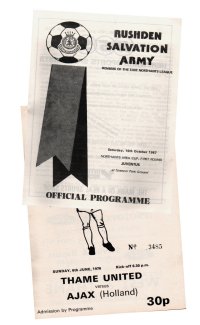 made
over 1 million pizzas a month, supplied 65% of the UK market, sales had
increased 700% in the previous 12 months.........just in case you might
think it interesting! made
over 1 million pizzas a month, supplied 65% of the UK market, sales had
increased 700% in the previous 12 months.........just in case you might
think it interesting!
My top prize though goes to Rushden Salvation Army v
Juventus. No, not a spoof programme, the match between the respective
first teams actually took place on Saturday 10th October 1987. Juventus
included Insalata, Jankovic, Bizzotto, Ippolito, Delloruso, Abbandanza and
Santoro. To be totally honest though I have to say please think less of
Serie A Juventus and more of Peterborough League Division 5 Juventus with
the match being in the First Round of the Northants Area Cup. There was a
touch of class about the Peterborough Juventus though with Luch Dellorusso
having once had a trial with AC Milan! I still wonder what was the
reaction of the Sally Army players when they heard the draw and realised
they had avoided Corby Hartlepool Candle, Yardley Gobion Reserves or the
Bugbrooke St Michael 'A' team and would be up against Juventus. Did they
all keep their programmes to bore their children and grandchildren of the
story of when they played Juventus in the cup? I wonder?
*******
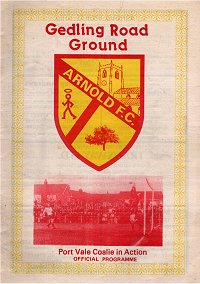 Programme
Misprint 6. Founded in 1928, Arnold Football Club is not by any means
the best known non-league football club, not even in their own Nottingham
locality. Twice they have played Football League sides in the First Round
of the FA Cup with their best performance being a home draw with Port Vale
in November 1977. It was perhaps not surprising that they would want to
commemorate that achievement. They did that with a picture on the cover of
their programme of the Port Vale goalie in action. Except that on the
programme it said the Port Vale coalie in action. And not just for
one match - it was a pre-printed cover for the whole season so every home
match that spelling mistake had to be endured by every programme purchaser
who knew how to spell. Programme
Misprint 6. Founded in 1928, Arnold Football Club is not by any means
the best known non-league football club, not even in their own Nottingham
locality. Twice they have played Football League sides in the First Round
of the FA Cup with their best performance being a home draw with Port Vale
in November 1977. It was perhaps not surprising that they would want to
commemorate that achievement. They did that with a picture on the cover of
their programme of the Port Vale goalie in action. Except that on the
programme it said the Port Vale coalie in action. And not just for
one match - it was a pre-printed cover for the whole season so every home
match that spelling mistake had to be endured by every programme purchaser
who knew how to spell.
******
|
It's
quite probable that if you could travel back in time you would
find that football supporters of today would have a lot in
common with the fans of a century or more ago. Judging by a
list of 'Don'ts for Spectators' printed in a
1907 Sheffield United programme fans on the terraces then had
the same things on their minds as we have now. But I just
can't imagine anyone wasting space in a modern programme
trying to stop us having our say!
What
they had to say in 1907.....
“Don’t think because you are on the stand you have a
right to shout instructions to players. They know what to do
without any assistance from you.
Don’t boo at the referee because he gives a decision which
you think is wrong. He has his opinion as to what happened,
and his opinion is surely worth as much as yours.
Don’t make yourself a nuisance to those around you by
continually bellowing at the top of your voice, it gets on
peoples nerves and takes away a lot of the enjoyment of the
game, besides making yourself look ridiculous.
Don’t commence shouting ‘Send him off’ if one of the
opposing team happens to commit a foul on one of your pet
players. Would you shout the same thing if the positions
were reversed, and one of your own side had committed the
offence?
Don’t snap your neighbours nose off because he thinks
differently to you. You have come to see your side win, and
he has perhaps come to see the others.
Don’t get excited and bad tempered when you argue about this
player and that. It does no good in the end, and only breeds
bad feeling, and spoils your enjoyment of the game”
|
|
*******
Can you imagine Manchester United
and Manchester City sharing a ground, or anything else for that matter?
The same with Arsenal and Spurs or Everton and Liverpool. Well it did
happen once - the two Liverpool clubs once shared a joint programme. It
didn't catch on!
*******
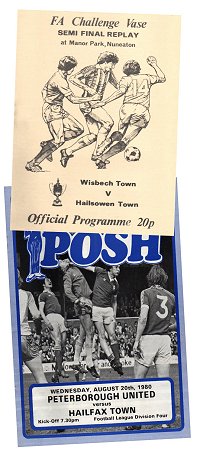
Programme
Misprint 7. Stick 'Hailfax Town' into Google and you get 11,000
hits which just shows how easy it is to misspell Halifax Town. Sadly for
Peterborough United one of those misspellings was on the front cover of
the programme for the Fourth Division match between Posh and Hailfax
Town, sorry Halifax Town, in August 1980, their first home League match of
the season. Arnold Blades, Posh club secretary at the time, told me that
the sight of that programme was one of his most embarrassing moments in
football!
I have to say I know the
feeling. In 1985 I produced the programme for the FA Vase semi-final
replay at Nuneaton between local side Wisbech Town and Halesown Town. A
big match for both clubs - it would decide which one would play in the
Wembley final. It's not uncommon for Wisbech to be spealt Wisbeach. I
managed the correct spelling for them but sadly not for Halesowen - the
cover has them as Hailsowen Town. After delivering the programmes I didn't
hang around to find out what they thought of them!
*******
A bit of humour in the programme
notes is always welcomed and back in the 1953/54 season Aldershot - then
in Division 3 South - printed in their programme what they thought were the
reasons for their poor home attendances -
| Population of Aldershot & District |
50,000 |
Less: people over 65 not interested in football, have
rheumatics or other old age complaints
|
15,000 |
Less: babes in arms and other toddlers
|
10,000 |
Less: people in hospital, lunatic asylums,
public houses, services, or otherwise indisposed
|
8,000 |
Less: husbands on allotments or at home doing
housework and wives out shopping
|
12,000 |
Less: people in jail
|
250 |
Less: shop assistants and others working
during football hours
|
3,904 |
Less: gatemen, officials, police and others
who do not pay for admission
|
150 |
Less: people who have acquired complimentary
tickets
|
200 |
Less: people who have climbed over railings
|
482 |
Leaving 14: manager,
trainer, secretary, 11 players
Thankfully the visitors bring some supporters with them!
|
And the maths are dead right!
*******
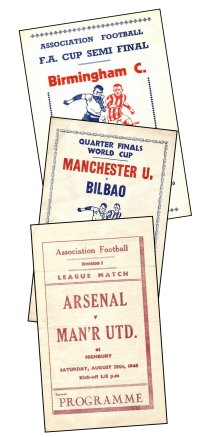 Well,
you would think that buying a programme is easy enough but there was a
time when even doing that was not as straightforward as it might seem.
Unofficial pirate programmes have been around since the beginning of time
but they were at their most popular in the late 1940s and 1950's when
every top match seemed to attract one or more pirate issues. It was legal
to sell the pirate publications provided they weren't described as
official programmes - they were therefore sold as 'Souvenir Programmes' to
unsuspecting fans. Not that many kept them as souvenirs as they were
poorly printed and rarely had any content worth reading, seemingly
produced by people who had no knowledge of football. Typical examples are
pictured alongside - the Manchester United v Bilbao 'Quarter Finals World
Cup' was in fact a European Cup tie. They are collectable although more
novelty and rarity value than anything else. Well,
you would think that buying a programme is easy enough but there was a
time when even doing that was not as straightforward as it might seem.
Unofficial pirate programmes have been around since the beginning of time
but they were at their most popular in the late 1940s and 1950's when
every top match seemed to attract one or more pirate issues. It was legal
to sell the pirate publications provided they weren't described as
official programmes - they were therefore sold as 'Souvenir Programmes' to
unsuspecting fans. Not that many kept them as souvenirs as they were
poorly printed and rarely had any content worth reading, seemingly
produced by people who had no knowledge of football. Typical examples are
pictured alongside - the Manchester United v Bilbao 'Quarter Finals World
Cup' was in fact a European Cup tie. They are collectable although more
novelty and rarity value than anything else.
Pirate programmes are still around.
Check out ebay after any English side has played an away European fixture
and you will find that print shops on the continent have cobbled together
one or more unofficial issues. At least the pirate programmes of old were
sold at the match they covered - most of the modern pirates haven't even
been printed when the matches are played!
*******
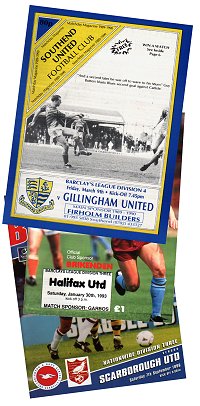
Programme Misprint 8. Well, the details of programme cover
misprints given on this page is definitely not a comprehensive one with
many more embarrassments having been recorded up and down the country.
Just a few more - back to Southend again and their League visitors in
March 1990 were Gillingham United rather than the correct Gillingham. In
January 1993 Scunthorpe renamed their visitors as Halifax United rather
than Halifax Town. In September 1996 Scarborough were re-christened
Scarborough United when they visited the Goldstone Ground for a Division 3
fixture against Brighton. In April 1979 Oxford United entertained Lincoln
City in a Division 3 fixture but the cover stated that it was a Football
Combination - reserve team - match. Alfreton Town had their 15 minutes of
world-wide fame when they beat Sheffield Wednesday 14-0 in a friendly in
July 2011 - but on the programme cover they had the season as 2010/11. And
the list goes on.... In fact with over 2000 League matches alone in a
season I think we will never we without a misprint or two to keep us
amused - and that's before we even open the programme to see what has been
written inside!
*******
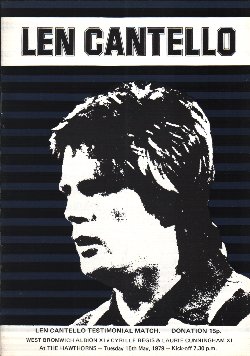
The Len Cantello testimonial
match at The Hawthorns on Tuesday 15th May 1979. For those
of us who watched the thought-provoking BBC 2 programme presented by
Adrian Chiles Whites v Blacks: How Football Changed a Nation you might think that
the match-day
programme would be dominated by an anti-racism theme and the justification
behind the
makeup of the opposing teams. Not so. As you might expect with a
testimonial the 12-page programme was all about Len Cantello who had
started at The Hawthorns as an apprentice
in 1967 and by 1979 had made 298 League appearances for the club. Career
notes,
playing stats and comments from football writers and players made up the
normal
testimonial offering. No mention of Blacks v Whites although in his notes
Len Cantello
does touch on the fact that it was obviously a sensitive subject: 'Tonight's
main match is
one that has been applauded by many people and I do not intend to be drawn
into the
political arena regarding the finer points. It has, and always has been,
nothing more
than a football match and I am sure the fans will enjoy every moment.'
The All Blacks won 3-2 and 7,023 were present to see it.
*******
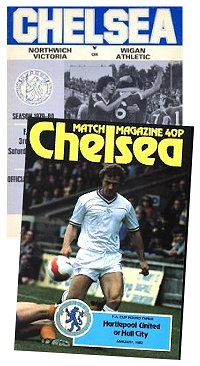 Are Chelsea unique in issuing
programmes for two matches when it hadn't been decided who they were
playing?
Because of a combination of Christmas/New Year holiday printing deadlines
and bad weather Chelsea needed to get programmes printed for two FA Cup
3rd Round ties before they knew exactly who they would be playing. So they
printed programmes with either/or opposition on the cover and full details
of both possible opponents inside. The first of those was in January 1980
when a combination of an abandonment, a draw and postponements meant that
the Second Round tie between Wigan Athletic and Northwich Victoria hadn't
been decided shortly before one of them was due to play at Stamford Bridge
in the Third Round. So to cover both options Chelsea issued a programme
against either Northwich or Wigan. As it was the Second Round tie was only
decided on the Monday after the Third Round match was due to have been
played and a week later victors Wigan duly visited Stamford Bridge to
record a shock victory over the Londoners in the Third Round.
Full 1979/80 FA Cup results. The same thing
happened two years later when poor weather delayed the outcome of the
Second Round match between Hartlepool and Hull and Chelsea did the same
again - this time issuing an undated programme with the opposition being
either Hartlepool or Hull. It was Hull who won through to play at Stamford
Bridge, the Third Round tie eventually being played over two weeks after
the scheduled date for Third Round matches. And just to add to the fixture
chaos it ended in a draw! Full
1981/82 FA Cup results. Are Chelsea unique in issuing
programmes for two matches when it hadn't been decided who they were
playing?
Because of a combination of Christmas/New Year holiday printing deadlines
and bad weather Chelsea needed to get programmes printed for two FA Cup
3rd Round ties before they knew exactly who they would be playing. So they
printed programmes with either/or opposition on the cover and full details
of both possible opponents inside. The first of those was in January 1980
when a combination of an abandonment, a draw and postponements meant that
the Second Round tie between Wigan Athletic and Northwich Victoria hadn't
been decided shortly before one of them was due to play at Stamford Bridge
in the Third Round. So to cover both options Chelsea issued a programme
against either Northwich or Wigan. As it was the Second Round tie was only
decided on the Monday after the Third Round match was due to have been
played and a week later victors Wigan duly visited Stamford Bridge to
record a shock victory over the Londoners in the Third Round.
Full 1979/80 FA Cup results. The same thing
happened two years later when poor weather delayed the outcome of the
Second Round match between Hartlepool and Hull and Chelsea did the same
again - this time issuing an undated programme with the opposition being
either Hartlepool or Hull. It was Hull who won through to play at Stamford
Bridge, the Third Round tie eventually being played over two weeks after
the scheduled date for Third Round matches. And just to add to the fixture
chaos it ended in a draw! Full
1981/82 FA Cup results.
*******
As mentioned earlier programmes
originally came into being from cards listing the players and today
knowing the team is still an essential part of watching a football match.
The programme seems to play a lesser part in that nowadays, just listing
squads and then relying on the PA system or TV screen to give the details
or leaving it to us with the shirt numbers. One match I remember - Fulham v Odense
in the Europa League in 2012 - is typical with a total of over 50 players listed
in the respective squads, including a number 99 in the Odense squad!
However probably the most iconic image in any programme is the team page
when no players were listed for one of the teams. That was in for the
first match played by Manchester United after the Munich air crash - a
poignant reminder, if there needed to be one, of the loses suffered by
Manchester United in the tragedy.
*******
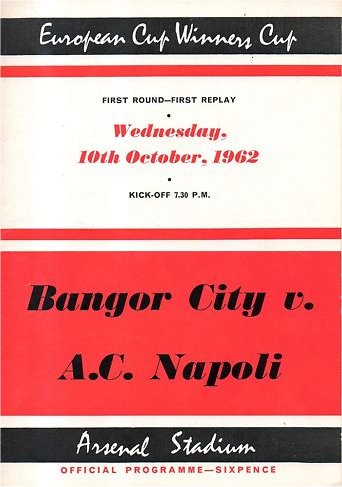
When it comes to fairytale cup-ties this one is surely towards the top of
the list.
Generally it was the Welsh Football League sides who represented that
country in the
European Cup Winners' Cup but in the 1962/63 season it was Bangor City -
part-timers from the Cheshire League - who were the Welsh representatives
in that competition. And for
their first venture in Europe they were drawn against top Italian side
Napoli and
amazingly they won the first leg 2-0 in
front of a 12,000 crowd at their Farrar Road ground.
A few more were present in the return match - in fact 80,000 were there to
watch the north Wales minnows come close to knocking out their illustrious
opponents. It was only
six minutes from the end that Napoli scored the final goal in the 3-1
victory to level the
aggregate score at 3-3. Nowadays that would have given the Cheshire League
side a
victory on away goals but in those days it was a replay at a neutral
venue. And no ordinary
venue at that with 21,895 being present at Arsenal’s Highbury ground on
10th October 1962 where again Bangor put up a good show in a 2-1 defeat
with Napoli’s winner not coming
until seven minutes before the end. Yes, a real fairytale.
*******
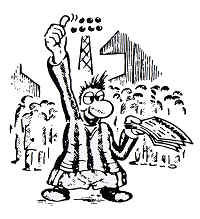 To
me buying a programme is part of the match-day routine. The first
programme I bought cost 3d (just over 1p) for 12 pages. Nowadays they cost
£s, they weigh a ton, don't fit in any pocket and are full of adverts!
The way we buy programmes has changed as well. Recently at the same ground
as I bought that 3d programme I couldn't find anyone selling programmes
outside the ground and had to go to the club shop to get one. Years ago
where you bought the programme was as much a part of the routine as buying
one. Most fans had their preferred vendors - like Bill Mainwood's
programme hut at Watford or the even more basic hut at the Feetham's
ground (pictured below). You can just see the pleasure on the faces of
those Darlington fans buying their programme! To
me buying a programme is part of the match-day routine. The first
programme I bought cost 3d (just over 1p) for 12 pages. Nowadays they cost
£s, they weigh a ton, don't fit in any pocket and are full of adverts!
The way we buy programmes has changed as well. Recently at the same ground
as I bought that 3d programme I couldn't find anyone selling programmes
outside the ground and had to go to the club shop to get one. Years ago
where you bought the programme was as much a part of the routine as buying
one. Most fans had their preferred vendors - like Bill Mainwood's
programme hut at Watford or the even more basic hut at the Feetham's
ground (pictured below). You can just see the pleasure on the faces of
those Darlington fans buying their programme!
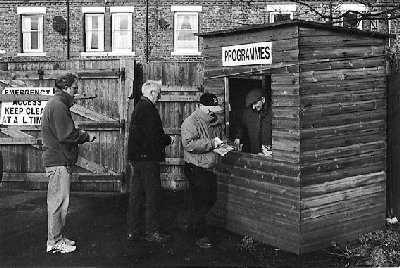
Well, the previous picture was how they sold the match-day programme
up't north in the old days while in contrast the picture below shows how they
were sold in the south
in the swinging sixties. A picture from Stamford Bridge in 1966. I just
wonder if the buying of a programme became more part of the routine at
Chelsea than at Darlington?
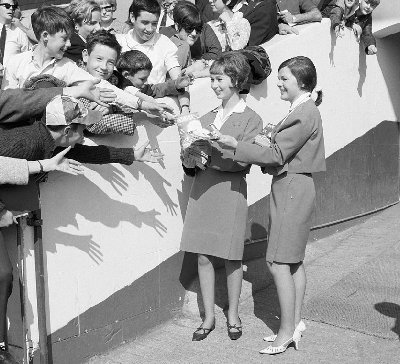
*******
The future? In response to some of
the EFL clubs wanting an option not to print programmes for League matches
because of declining sales and increased costs a vote at the Football
League's AGM in June 2018 ended the requirement of League clubs to print
matchday programmes for every game. How long will it be before everything
printed is a thing of the past? The future is digital and I guess those
Apps are never going away! Devices are taking over the world so what
chance has the printed football programme got when electronic
communications are cheaper and more up to date - and can still present
adverts to the readers! We shall see!
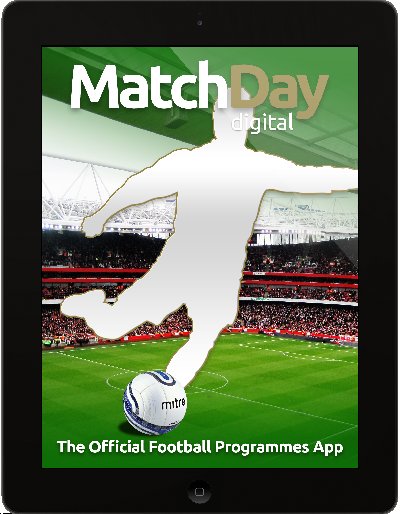
|